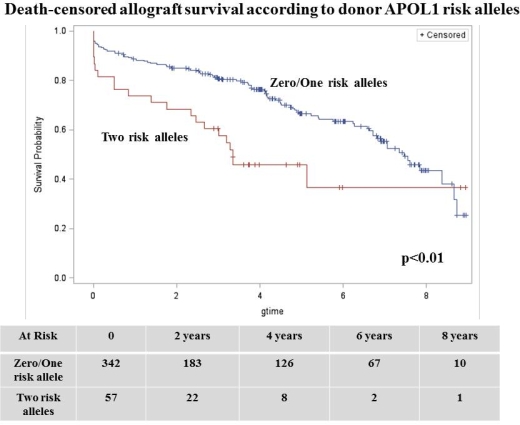APOL1 Risk Alleles in Live and Deceased Kidney Donors Are Associated With Shorter Renal Allograft Survival
1Medicine, Wayne State University, Detroit, MI
2Medicine, Henry Ford Transplant Institute, Detroit, MI
3Medicine, University of Michigan, Ann Arbor, MI
4Gift of Life, Ann Arbor, MI
5NCI, NIH, Bethesda, MD
6NIDDK, NIH, Bethesda, MD.
Meeting: 2015 American Transplant Congress
Abstract number: 356
Keywords: Genomic markers, Kidney, Survival
Session Information
Session Name: Concurrent Session: Glomerulonephritis/Recurrent Disease
Session Type: Concurrent Session
Date: Tuesday, May 5, 2015
Session Time: 2:15pm-3:45pm
 Presentation Time: 2:15pm-2:27pm
Presentation Time: 2:15pm-2:27pm
Location: Room 121-AB
Kidneys from African American (AA) donors with two Apolipoprotein L1 (APOL1) risk alleles may be at higher risk of allograft loss after transplant. We sought to study the effect of APOL1 risk alleles in live and deceased kidney donors on renal allograft outcomes. Genotyping was performed in 191 consecutive AA deceased donors whose kidneys were procured by the Gift of Life, MI Organ Procurement Organization between 2000 and 2010 and also in 101 AA live kidney donors who underwent donor nephrectomy at Harper University Hospital or Henry Ford Transplant Institute between 1990 and 2010. Post-transplant outcomes were ascertained from United Network of Organ Sharing and chart review. Of 399 recipients, 101 (25%) received a kidney from a live donor and 298 (75%) from a deceased donor. We analyzed the recipients outcomes according to donor genotype, two APOL1 risk alleles (n=57, 14%) versus zero/one risk alleles (342, 86%) in the donor. There were no significant differences in donor and recipient characteristics between the two genotype groups. While there was no difference in death censored graft loss between the two groups (47% versus 36%; p=0.12), the median time to graft loss was shorter in the recipients of two APOL1 risk allele kidneys (748 versus 1393 days; p=0.01).  shows Kaplan-Meier survival analysis, with shorter allograft survival for two APOL1 risk allele kidneys (p<0.01). Cox proportional hazard model adjusted for donor-, recipient- and transplant-factors showed that the presence of two APOL1 risk alleles in the donors was associated with increased risk of graft loss in the recipient with HR 2.1 (95% CI, 1.3-3.6; p<0.01). Presence of two APOL1 risk alleles in the kidney donor was associated with accelerated graft loss in the recipient. Further studies are warranted to understand the mechanism by which APOL1 risk alleles promote early graft loss.
shows Kaplan-Meier survival analysis, with shorter allograft survival for two APOL1 risk allele kidneys (p<0.01). Cox proportional hazard model adjusted for donor-, recipient- and transplant-factors showed that the presence of two APOL1 risk alleles in the donors was associated with increased risk of graft loss in the recipient with HR 2.1 (95% CI, 1.3-3.6; p<0.01). Presence of two APOL1 risk alleles in the kidney donor was associated with accelerated graft loss in the recipient. Further studies are warranted to understand the mechanism by which APOL1 risk alleles promote early graft loss.
To cite this abstract in AMA style:
Doshi M, Goggins M, Norman S, Ho S, Winkler C, Kopp J. APOL1 Risk Alleles in Live and Deceased Kidney Donors Are Associated With Shorter Renal Allograft Survival [abstract]. Am J Transplant. 2015; 15 (suppl 3). https://atcmeetingabstracts.com/abstract/apol1-risk-alleles-in-live-and-deceased-kidney-donors-are-associated-with-shorter-renal-allograft-survival/. Accessed February 19, 2026.« Back to 2015 American Transplant Congress
